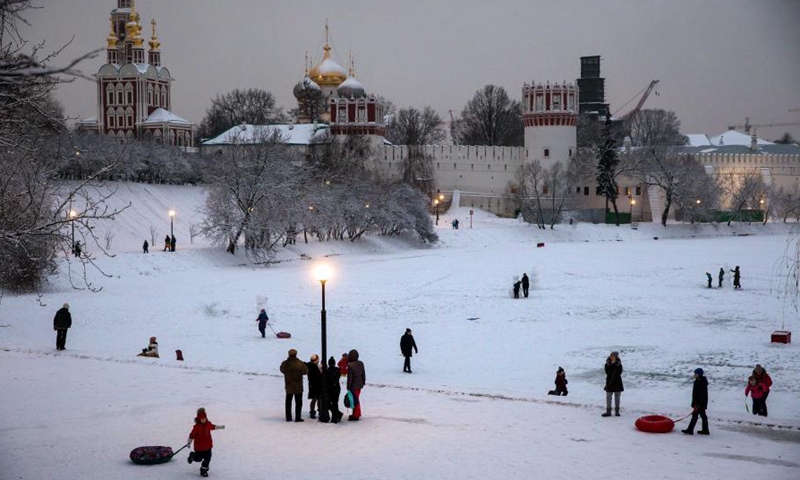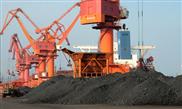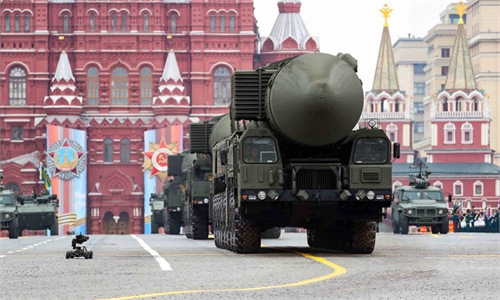
People enjoy their time near the Novodevichy Monastery in Moscow, Russia, on Jan. 2, 2021. (Photo by Maxim Chernavsky/Xinhua)
Anti-government protests took place in cities across Russia including Moscow, in support of opposition leader Alexei Navalny. Western media outlets quoted unofficial sources as saying over 3,000 protesters were arrested.
Navalny, 44, was a lawyer and has devoted himself to leading opposition campaigns since a decade ago. While on probation in August 2020, Navalny was poisoned and allowed by Russian authorities to go to Germany for treatment. Navalny accused the Russian government of being responsible for his poisoning, which has been denied flatly by Russia but has won support from the West. On January 17, when he returned to Russia from Germany, he was detained upon arrival.
The protests in Moscow and other Russian cities on Saturday were not officially approved. After they broke out, the US and other Western countries soon voiced their concern, demanding Russia to release the detainees. The US Embassy in Russia announced the time and location of the Russian demonstrations even before they took place, under the excuse of reminding local Americans to watch out for their own safety. But as a matter of fact, the announcement helped incite and guide the protesters. The Russian Ministry of Foreign Affairs expressed strong opposition against the US' move.
At present, the Western world is unanimously condemning Russia. The West not only demands the release of the arrested protesters and Navalny himself, but the EU is also preparing to impose new sanctions on Russia.
The latest riot and the conflicts surrounding it have made it more difficult for Russia to ease relations with the US and Europe. This may become the latest sign of the decline in their relations with the US and Europe. This is not the right time for the US and its allies to attack Russia on the excuses of the so-called democracy and human rights issues. Not long ago, rioters stormed the US Capitol and five people died. In 2020, anti-racial discrimination protests lasted for a long time in the US, and the US police implemented a series of repressive actions. Now they are supporting anti-government protests in other countries. This is morally contradictory. The US' double standards are too obvious and will be mocked by the world.
Political opponents naturally exist in Russia and it is inevitable that they have some supporters. Supporting these opposition groups is the most effective way for the West to act against Russia. However, Russia has adapted to the intermittent actions of the opposition and has formed a set of effective methods to deal with them. Generally speaking, anti-US sentiment is far strong than the pro-US complex in Russia. In the 1990s, former Russian leader Boris Yeltsin implemented a pro-US path but was eventually fooled by the US, and Russia's national power and international status was weakened as a result. The lesson has been deeply imprinted in the Russian society.
Most Russians understand that the long-term US policy is to alienate Russia and weaken its strength. The existence of the Russian opposition is a reality, determined by the political pattern. However, the power of those opposition forces is limited, because Russian people are clearly aware that Russian opposition forces are made use of by Washington as leverage against Moscow. People now are more supportive of Russian President Vladimir Putin and his team, which are firmly safeguarding the country's strategic interests.
The West has called out Moscow for being "authoritarian." Russia has realized a multi-party system, with political opposition able to legally exist. In the country's previous presidential elections, there has been situation which was not in favor of the ruling party. Still, Russia is defined by the US and the West as an "authoritarian country." Its political evolution has not provided itself with key resources for easing its tense ties with the West.
In the final analysis, Russia is simply too big and possesses a nuclear deterrent that is well matched with that of the US. The US and the West do not accept Russia's existence in this powerful and independent way. Therefore, Washington and Brussels have been sticking to the strategic consideration of weakening Russia in their Russia policies.
But we believe that Russia will not be defeated by the US and the West. Russia has an unimaginable resilience and endurance that Westerners cannot imagine. Russia is sophisticated in diplomacy and competition. Russian public opinion has gone through the test of a severe economic downturn when oil prices were extremely low in the country in previous years. Since the COVID-19 outbreak, Russia has not experienced more serious difficulties than the Western world. If the US and the West launch political troubles now, then time and luck will not stand by their side.
The US and other Western countries will intervene in any country that has domestic troubles. It is most important for developing countries not to give them such opportunities. Let time pass. It is still unknown which will be more chaotic in the future, the US and the West, or major developing countries..



